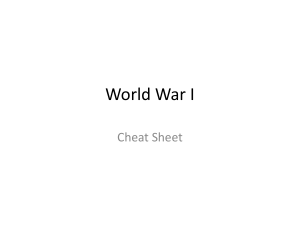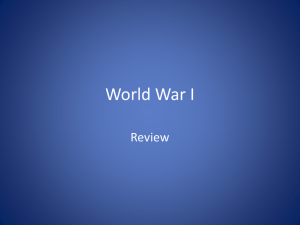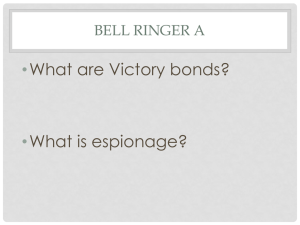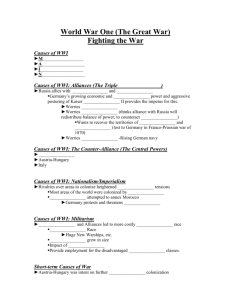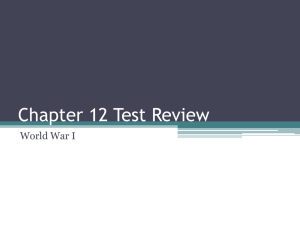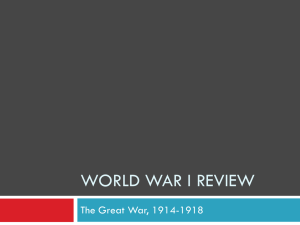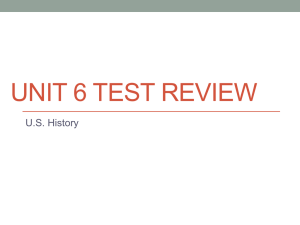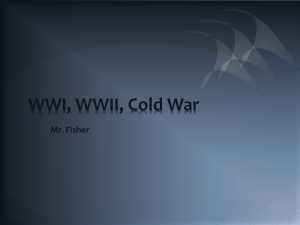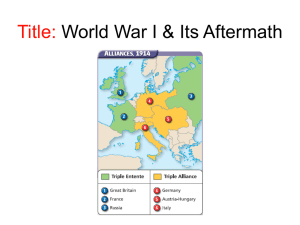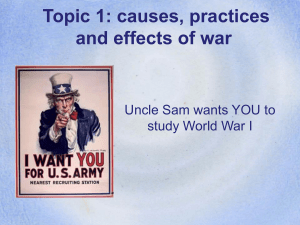Imperialism and WWI Test Review
advertisement
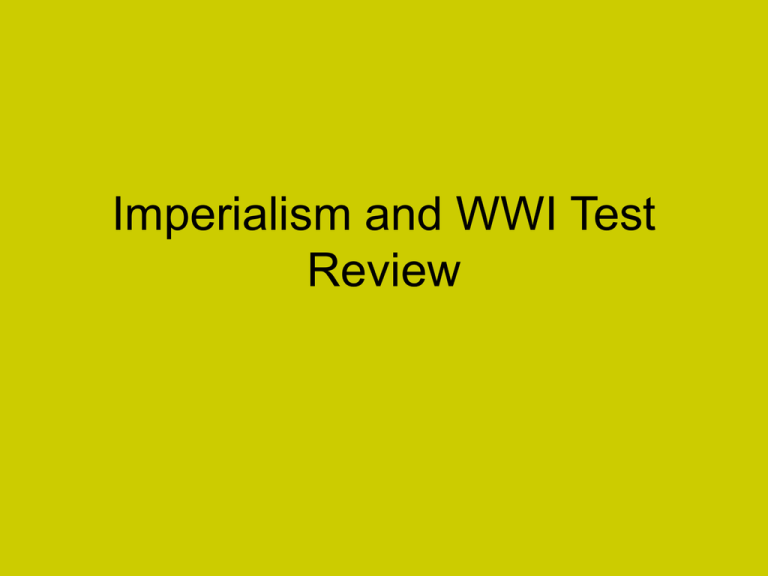
Imperialism and WWI Test Review Imperialism • Extending a nation’s authority over another by economic, political or military means Alaska • Purchased from Russia • Important for natural resources, including oil Puerto Rico • Freed from Spain, still a U.S. territory Cuba • Freed from Spain and became an independent nation Yellow Journalism • Attempt by newspapers to sell more papers by writing sensational stories Philippines • Freed from Spain, not independent until 1946 Rough Riders • Volunteer cavalry unit during Spanish American War Treaty of Paris • Ended Spanish American War Panama Canal Locations • Panama or Nicaragua Panama • Had been part of Colombia Apology to Colombia • U.S. later apologized for helping Panama rebel Panama Canal- Previous attempt • France tried, but gave up U.S. Control in 1900 • • • • Puerto Rico Hawaii Alaska Philippines 1905 War • Russo-Japanese • Teddy Roosevelt won the Nobel Peace price for mediation Aguinaldo • Led revolt against the U.S. in the Philippines Causes of WWI • • • • Militarism Alliances Imperialism Nationalism Assassination of Franz Ferdinand • Where? Bosnia • Who? Gavrillo Princip and the Black Hand Schleiffen Plan • German plan to quickly defeat France, then defeat Russia I’ll have Paris for Lunch... St. Petersburg for dinner. Mobilization • Preparing for War- militarily and for civilians Kaiser Wilhelm II • Leader of Germany during WWI Nicholas II • Leader of Russia at the beginning of WWI Trench Warfare • Main form of warfare during WWI • Resulted in a stalemate for several years War Industry Board • In charge of transforming U.S. business to war production Beginning of WWI- U.S. Opinions • Stay Neutral 1916- Wilson’s Campaign • “He kept us out of war” American Entry to WWI • Lusitania • Zimmerman Telegram • Making the World Safe for Democracy Russia in 1918 • Dropped out of the war • Replaced by the U.S. Lusitania • British ship, sunk by a German Uboat • Damaged U.S.-German relations Zimmerman Telegram • Sent by a German ambassador to Mexico • Attempt to gain Mexico as an ally with Germany • Mexico would regain territory in southwest U.S.- Texas, New Mexico and Arizona German Unrestricted Submarine Warfare • Main reason for U.S. entry to WWI Propaganda • Tool molding public opinion to support the war • Employs techniques such as the use of emotionally charged words or posters Espionage and Sedition Acts • Allowed the government to silence ideas that challenged its authority Conscription • Compulsory enrollment in military service • Draft of men 21-30 Eugene V. Debs • Imprisoned for speaking against the U.S war effort The Big Four • • • • Great Britain France Italy U.S. 14 Points • Included Freedom of the seas for travel and trade • Reduction of weapons • Self-determination • League of Nations 14 points Opposition • Great Britain and France- strongly against Senate Opposition to League of Nations • Fear it would drag the U.S. into European conflicts Treaty of Versailles • Ended WWI League of Nations • Rejected by the U.S. Senate • America wanted to return to isolationism War Guilt Clause • WWI was solely Germany’s fault Bolshevik • Term for a revolutionary communist Woodrow Wilson • President of U.S. during WWI • Author of the 14 Points Irreconcilables • Group of senators, strongly opposed to the League of Nations David Lloyd George • Prime Minister of Great Britain • Wanted to make Germany pay William Jennings Bryan • Sec. of State under Wilson • Wanted to maintain neutrality, despite U-boat attacks Doughboys • Nickname for U.S. infantrymen in WWI No Man’s Land • Area between two enemy trenches Conscientious Objector • Person opposed to all wars on religious or moral grounds John J. Pershing • U.S. General • Leader of the American Expeditionary Force Allies • France • Great Britain • Russia… Than later the U.S. Central Powers • AustriaHungary • Germany • Ottoman Empire African American Troops • Served in segregated units Stalemate • When neither side can gain an advantage Self Determination • The right of groups of people to choose their own national identity Reparations • Payments made by the losers of a war to compensate the victors
